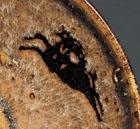J.J. Lally & Co., Oriental Art / New York City, New York
MenuPast Exhibition
Early Chinese Ceramics: An American Private Collection
March 28 - April 16, 2005
27.
A JIZHOU TEABOWL WITH RUNNING DEER DECORATION
Southern Song Dynasty (A.D. 1127–1279)
the small bowl with steep flaring sides rising to a narrow concave ‘finger-groove’ below the thin everted lip, covered with a variegated tan-brown glaze on the interior punctuated with three dark brown silhouettes of running deer evenly spaced around the sides, all shown with legs outstretched, two with head turned back and one facing forward, as if chasing one another in a circle, the glaze shading darker towards the rim and the underside covered with a dark brown glaze showing buff ‘tortoise-shell’ markings scattered throughout, the small wedge-shaped ring foot and recessed base left unglazed revealing the pale buff-colored pottery.
Diameter 4 7⁄8 inches (12.4 cm)
The use of paper cutouts to decorate ceramics was a Song dynasty innovation. These wares were produced exclusively at the Jizhou kilns in Jiangxi province. Teabowls with variegated ‘tortoise-shell’ glazes and various different cutout designs were the most popular of all Jizhou ceramics. The decorative motifs most commonly seen are birds and flowers. The deer motif is very rare.
Although there is general agreement that cut paper stencils were used to produce the decoration on Song Jizhou ceramics, the exact technique remains a mystery. Various theories have been proposed. It has been suggested that the paper cutouts were simply left on top of the glaze and allowed to burn up in the firing. Another theory is that the bowls were glazed twice, first with a dark brown color and a second time with a paste of wood-ash and slip, with the stencils laid in place over the semi-dry first glaze before the second glaze was applied. After the second layer of glaze was dry the paper stencils could be removed, revealing the motif in the darker primary glaze.
A complete explication of current theories of the techniques used for decorating Song Jizhou wares is provided by Mowry in Hare’s Fur, Tortoiseshell and Partridge Feathers: Chinese Brown-and Black-Glazed Ceramics, 400–1400, Cambridge, 1996, pp. 240–242, where the author illustrates two teabowls similar to the present example in form but decorated with different motifs, no. 96 and no. 100.
宋 吉州剪紙貼花鹿紋碗 徑 12.4 厘米
